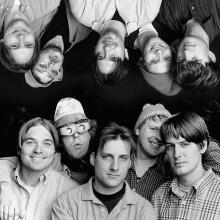The first thing you notice about Sebastian Stan’s performance as Donald Trump in The Apprentice is the voice — or rather, the lack thereof. By now, years of listening to speeches and sound bites (not to mention multiple SNL impressions) have accustomed us to Trump’s exaggerated intonations and speech patterns. So when Stan’s Trump first speaks, meekly and with few traces of the voice we’ve come to know so well (minus the slightest hint of a “‘uge” or “peoPLE” here or there), it’s a shock to the system.
For director Ali Abbasi's biopic, that’s the point. Trump didn't just become the bloviating, corrupt egomaniac we're all far too aware of overnight. No, someone molded him to that point, and according to the film, that someone was notorious lawyer Roy Cohn (Succession's Jeremy Strong). Cohn and Trump's mentor-apprentice relationship kickstarts The Apprentice's propulsive, if not always effective, dissection of the making of Donald Trump.
What's The Apprentice about?

The Apprentice frames Cohn and Trump's first meeting as that of an ingenue making a deal with the devil. As Trump sits awkward and alone in an elite New York City club, Cohn locks eyes with him from across the room. Strong's unbreaking gaze and some foreboding synths courtesy of composer Martin Dirkov drive home the fact that this man is the baddest of bad news. But after one conversation about how Trump and his father (Martin Donovan) can beat a federal lawsuit concerning racial discrimination against tenants, Trump takes Cohn on as his lawyer. In turn, Cohn takes Trump on as his protégé.
Cohn teaches Trump his three major rules for winning at all costs. One: "Attack, attack, attack." Two: "Admit nothing, deny everything." Three: "No matter what happens, you claim victory, and never admit defeat." If you pay even an ounce of attention to American politics, it's not hard to read any of these tactics onto Trump's presidency and re-election campaign. But in The Apprentice, we get to see Trump try these strategies out for the very first time, using them in his efforts to build a real estate empire and even court his first wife Ivana (Maria Bakalova, Borat Subsequent Moviefilm).
Sebastian Stan makes a solid Donald Trump, but Jeremy Strong's Roy Cohn is the standout.

As Trump embraces Cohn’s teachings and grows into a ruthless businessman, Stan’s performance changes too. He takes on many of the mannerisms we associate with Trump today, from his exaggerated hand movements to the rambling quality of his speech — the latter also comes courtesy of screenwriter and journalist Gabriel Sherman.
But even while Stan becomes “Trumpier,” his performance never veers into caricature. As horrifying as many of the things Trump does in this movie are — including an upsetting scene of marital rape — it’s clear The Apprentice doesn’t wish to ridicule outright. Instead, it lays out its version of events and the man who caused them and lets their absurdity and evil speak for themselves.
Central to this absurdity and evil is Cohn, played with scene-stealing intensity by Strong. Each focused stare demands your fullest attention, to the point that you feel like you're under a microscope alongside Trump or the other men Cohn sizes up. But Strong's Cohn isn't just all extreme evil, all the time. He finds some humor in his performance, often accentuating Cohn's tirades with a turkey-like neck bob that may just be the most mesmerizing thing in the film.
Since Strong's Cohn is such a magnetic presence, it makes sense that The Apprentice's best scenes are the ones Cohn and Trump share. Here, Abbasi's vision is clearest, showing us the genesis of a monster and the man who created him. It feels almost like a '70s-tinged Frankenstein story, with a graphic late scene of Trump undergoing liposuction and surgical treatment for his bald spot furthering the connection.
What can The Apprentice say about Donald Trump that hasn't already been said?

Unfortunately, once The Apprentice jumps from the '70s to the '80s — a change accompanied by a visual shift from warm, grainy film to the cooler wobble of VHS — Cohn and Trump's scenes dwindle. By this point, Trump is rampaging through the real estate world, on a quest to go higher and higher. Meanwhile, out of sight, Cohn is dealing with his AIDS diagnosis. His absence throughout this portion of the film speaks louder than a hundred long-winded Trump speeches. Not only are we missing out on The Apprentice's best performance, we're also missing the twisted friendship that makes it tick.
Without Cohn around as much, The Apprentice throws us into a stretch that might as well be summarized as "Trump's greatest hits from the '80s." This includes several moments that gesture at Trump's future in politics, including Trump taking in Ronald Reagan's campaign slogan, "Let's Make America Great Again." (Earlier footage of Richard Nixon saying "I'm not a crook" also points to Trump's own criminal activity.) Yet these nods to the future fall flat, playing like dull historical Easter eggs instead of knowing comedic beats.
The latter sections of The Apprentice also hit us over the head as much as possible with things we already know about Trump: his lies, his affairs, his willingness to shove others under the bus so he comes out on top. These elements are all deeply ingrained in the current political moment, and you would hope that in an election year, a Donald Trump biopic might have more to add beyond rehashing his worst qualities. (Although that may be a useful reminder for some voters.)
The Apprentice almost transcends its rehashing of history thanks to Cohn and Trump's dynamic, which brings to the screen a genuinely fascinating relationship that may not currently be the most general knowledge. Sure, Trump is a showy figure, but it's his relationship with Cohn that makes for The Apprentice's dark, oozing heart.
The Apprentice was reviewed out of Fantastic Fest. It hits theaters Oct. 11.
Topics Film















